In the realm of artificial intelligence, researchers are constantly seeking ways to improve the performance of AI systems. One approach that has shown promising results is the integration of diversity into the training process. By allowing AI systems to explore a wider range of strategies and solutions, researchers are finding that these diversified systems are more effective in problem-solving tasks.
The Experiment
A recent study led by Zahavy and his team set out to explore the impact of diversity on AI systems. They developed a new version of AlphaZero that included multiple AI agents trained independently and on various situations. The algorithm governing the system acted as a matchmaker, identifying the best agent to make a move. Additionally, a “diversity bonus” was included, rewarding the system for exploring a wide selection of choices.
When the diversified AI system was put to the test, the team observed a significant increase in variety. The AI player experimented with new openings and strategic decisions, often outperforming the original AlphaZero. Not only did the diversified version solve twice as many challenge puzzles as the original, but it also tackled more than half of the catalog of Penrose puzzles. This highlights the potential of creative diversity in AI systems.
The implications of this study extend beyond the game of chess. Cully, another researcher involved in the project, believes that a diversified approach can benefit any AI system, not just those based on reinforcement learning. By training physical systems with diversity, such as a six-legged robot exploring various movements, researchers can uncover innovative solutions in various domains, including drug discovery and stock trading strategies.
Creativity in AI Systems
The study suggests that AI systems can be trained to think creatively by considering a wider range of options. By rewarding the selection of diverse strategies, the system can strengthen its problem-solving capabilities and ultimately emulate human-like creative thinking. This sheds light on the connection between computational power and intelligence, suggesting that creativity can be viewed as a computational problem.
Future Outlook
While a diversified AI system shows promise in enhancing performance, there are still challenges to address. The approach is computationally expensive due to the need to consider numerous possibilities. Additionally, researchers believe that there is room for further exploration and the discovery of alternative solutions. Despite these limitations, the findings highlight the potential of diversity in boosting the capabilities of AI systems.
The integration of diversity into AI systems has shown significant promise in enhancing performance and problem-solving abilities. By encouraging exploration of a wider range of strategies, researchers are unlocking new possibilities for creative thinking in artificial intelligence. As technology continues to advance, the power of diversity in AI systems is likely to play a crucial role in shaping the future of artificial intelligence.


Leave a Reply